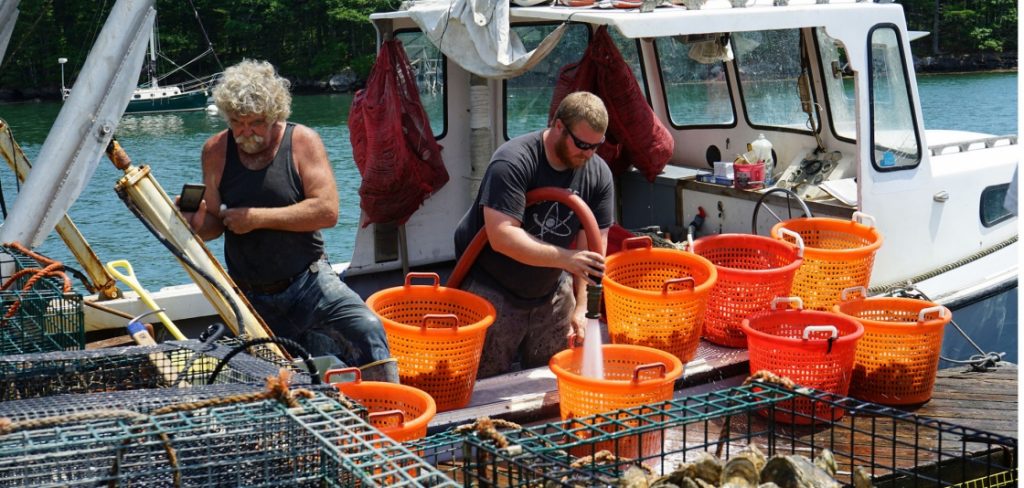
Maine farmers unite to quash proposed aquaculture ‘reform’ bill
April 22, 2021
By
Liza Mayer
 Maine seafood farmers claim "a victory for aquaculture" against a proposed bill. (Photo: Christopher Katalinus, NOAA Sea Grant)
Maine seafood farmers claim "a victory for aquaculture" against a proposed bill. (Photo: Christopher Katalinus, NOAA Sea Grant) Members of Maine’s community who make a living in its waters put forward a powerful case against an aquaculture bill in the state that prompted even the bill’s sponsor to vote against it.
LD 1146, sponsored by Rep. Robert W. Alley Sr. (D-Beals), would have restricted the size of aquaculture leases and further tightened the state’s already stringent regulatory framework.
But on April 20, seafood farmers of all sizes and members of the lobstering community made their case heard before the Marine Resources Committee, attesting to the grave impact the bill will have on coastal livelihoods.
“Current law already prohibits the Maine Department of Marine Resources from issuing a lease to a farmer if it does not comply with a series of criteria designed to protect the environment, prevent conflicts with other user groups, prevent interference with navigation, and prevent obstruction of riparian landowners’ access to the water,” said Executive Director Sebastian Belle of the Maine Aquaculture Association.
The proposal includes the repeal of the Natural Resources Protection Act, which would have added a “visual impact” criterion to the lease application requirements. It would also have repealed site development exemptions for any leases larger than five acres, limit leases to 50 acres and restrict owners from holding more than 10 leases or a total of more than 100 acres.
“The site development law was developed for Land Development. For example, if somebody wants to come into an area and put a supermarket in or wants to put a housing development in and it’s over five acres, they are required to do what’s called an alternate sites analysis, which means they basically have to go and look at a couple of other areas and tell the Department of Environmental Protection why the development shouldn’t occur in another area,” explained Belle.
“In the case of aquaculture, what that would mean is that we would have to go from one site to another anytime somebody objected to the alternate site. We would have to find other sites, which means you’d end up in this endless Nimby loop.”
Belle described the outcome of the virtual committee hearing as a victory for aquaculture and a testament to the strength of and unity among members of Maine’s working waterfront community.
“Testimony from lot of very young, very entrepreneurial people starting their own businesses right across the board all the way from shellfish and seaweed to finfish proved so compelling,”
As for Alley deciding to vote against his own bill, Belle commented, “Rep. Alley’s motivations were very sincere. He was responding to constituents’ concerns and interests, but I don’t think he understood how diverse and how large the aquaculture sector is and how closely it’s linked to Maine’s traditional working Waterfront (culture). He comes from a fishing family himself. I think he was quite surprised by how many fishermen came out and testified in opposition to the bill because they’re using aquaculture as a way to diversify their income.”
Rep. Alley’s office has not responded to our request for comment by press time.
Advertisement
- AVC students gain valuable experience in aquatic animal research
- NFI names new communications director





